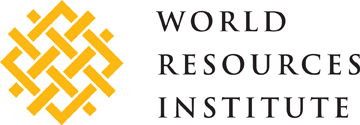Welcome to PortWatch: Monitoring Trade Disruptions from Space
PortWatch, a winner of the IMF Climate Innovation Challenge, was officially launched on November 15. Developed by the IMF and the University of Oxford, this innovative platform enables real-time monitoring of maritime trade, mapping and simulating port disruptions, and analyzing climate risks to global supply chains. For an insight into its capabilities, watch this brief video and explore the platform at https://portwatch.imf.org/.
If you missed the live launch event, you can watch the recording.
Highlights from the 2023 Annual Meetings
At the 2023 World Bank Group/IMF Annual Meetings, two exceptional winners of the Climate Innovation Challenge showcased their cutting-edge tools.
The Machine Learning Toolbox for Climate Policy Analysis (MLCPA) is a tool that robustly identifies and analyzes dramatic emission pattern shifts, offering sector-specific mitigation insights and a one-stop shop for past climate policies.
Economist Yunhui Zhao (left) and Li Tang, a Senior Computational Economics Expert at the IMF, take the stage at the 2023 Annual Meetings in Morocco
PortWatch, officially set to launch on November 15, is a user-friendly platform designed to monitor and simulate maritime trade disruptions, offering valuable insights into assessing the impact of natural disasters and understanding the effects of recent sanctions on oil trade.
Watch the Analytical Corner: Tracking Trade Disruptions from Space
Alessandra Sozzi, Data Analytics Officer at the IMF, presents at the Analytical Corner in Marrakech
Stay tuned for more updates as the winning teams continue to develop and bring to life their innovative solutions.
An Update from the Climate Innovation Challenge Teams
During the midpoint briefing of the Climate Innovation Challenge at the IMF headquarters, five winning teams and an exceptional runner-up provided an update on their innovative projects. Get inspired by watching the short videos below, where team representatives share their insights.
Machine Learning-Based Toolbox for Climate Policy Analysis (MLCPA)
Discover an innovative machine learning-based toolbox that facilitates country teams in offering targeted and impactful climate policy advice. Watch how this tool helps identify policies to mitigate carbon emissions and enables countries to learn policy lessons from one another.
Speakers: Yunhui Zhao and Jiaxiong Yao (IMF)
Adapting External Sector Assessments to Climate Change
Explore analytical tools that incorporate climate change considerations to evaluate current account balances and exchange rate misalignment. Learn how these tools estimate climate financing needs and support international climate finance efforts.
Speaker:Russell Green (IMF)
PortWatch—Monitoring Disaster-Related Trade Disruptions from Space
Experience the power of satellite-based vessel data and big data analytics in monitoring trade disruptions caused by natural disasters. See how this user-friendly online portal enhances our understanding of global supply chains.
Speakers:Robin Koepke and Alessandra Sozzi (IMF)
Model-Based Macroeconomic Frameworks for Assessing Climate Impact
Experience a model-based framework that assesses the macroeconomic effects of climate events and policies in emergingmarkets and developing economies (EMDEs). Explore an easy-to-use interface that facilitates policy analysis and supports dialogue with country authorities.
Speaker: Vu Chau (IMF)
Sustainable Procurement
Explore a comprehensive framework for Sustainable Public Procurement that promotes environmental protection, social progress, and economic development. Be inspired to accelerate sustainability efforts and contribute to ‘walking the talk’ in the Fund operations.
Speaker: Monika Tschida-Spiers (IMF)
DMXi—Integrating Climate Change into Your Country's Macro Framework
Follow the development of a tool that enhances macro modeling and forecasting for country teams. Learn how DMXi solves multiple scenarios in macroeconomic forecasting while seamlessly integrating with existing tools.
Speaker: Jerry Chaves (IMF)
Climate Innovation Challenge Workshop at 2023 Spring Meetings
The IMF held a workshop during the 2023 Spring Meetings to showcase two winners of the Climate Innovation Challenge: “PortWatch—Monitoring Disaster-Related Trade Disruptions from Space,” and “A Machine Learning-Based Toolbox for Climate Policy Analysis.” The workshop aimed to spotlight data-driven insights and solutions that help countries mitigate emissions and build resilience to climate change.
The event commenced with introductory remarks from Johannes Wiegand, Co-Chair of the IMF’s Climate Advisory Group and Advisor in the Strategy, Policy, and Review Department, and Bert Kroese, Director of the Statistics Department, IMF.
The first session showcased the PortWatch platform, which allows users to monitor local and global spillovers from natural disasters by leveraging insights on the international trade network and satellite-based vessel data.
The second session provided an overview and live demonstrations of a machine learning-based climate toolbox that helps identify and analyze dramatic changes in emission patterns and sheds light on potential game-changing emission mitigation policies.
Miroslav Delaporte, a Senior Advisor in the Swiss-led constituency at the World Bank, delivered the closing remarks on behalf of the Swiss State Secretariat for Economic Affairs (SECO), a sponsor of the Challenge.
Both solutions will be available online later this year.
Announcing the Winners
Congratulations to the winning teams!
- Model-Based Macroeconomic Frameworks for Assessing Climate Impact
- DMXi—Scenario Analysis to Integrate Climate Change in Your Country’s Macro Framework
- Monitoring Disaster-Related Trade Disruptions from Space
- Machine Learning-Based Toolbox for Climate Policy Analysis
- Adapting External Sector Assessments to Climate Change
The winning teams were selected based equally on the quality of their pitches, finalized bootcamp deliverables, and the following criteria: (i) relevance and potential impact; (ii) feasibility; (iii) innovation and additionality; (iv) team composition and engagement; and (v) support from stakeholders.
Winners will receive up to $50,000 in seed funding to develop a concrete proof of concept to further their ideas.
Meet the Top Eight Teams that Have Completed the Bootcamp
Machine Learning-Based Toolbox for Climate Policy Analysis
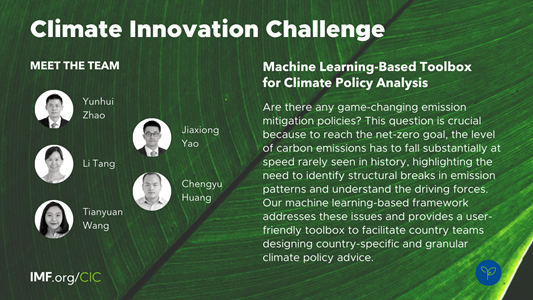
Adapting External Sector Assessments to Climate Change

Model-Based Macroeconomic Frameworks for Assessing Climate Impact
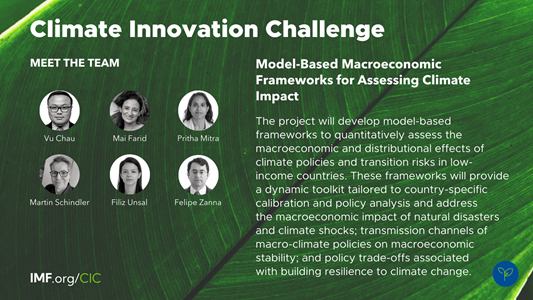
Monitoring Disaster-Related Trade Disruptions from Space
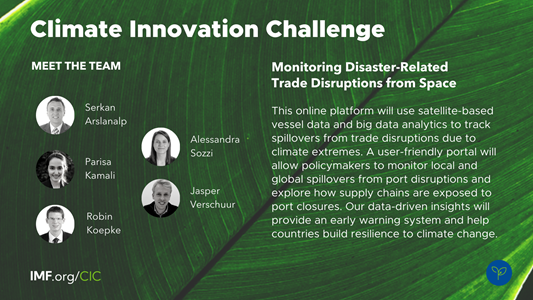
Reducing Our Carbon Footprint Through Green Procurement
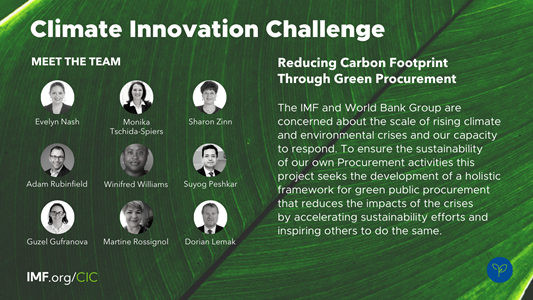
DMXi—Introducing Scenario Analysis to Integrate Climate Change in Your Country’s Macro Framework
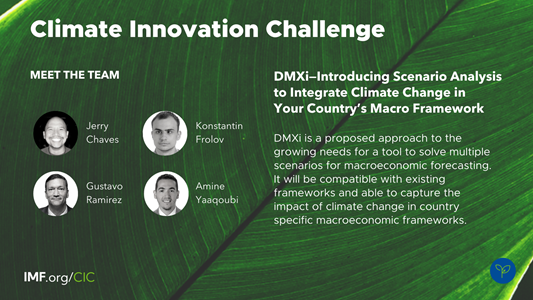
Tools to Advance Sustainable Travel
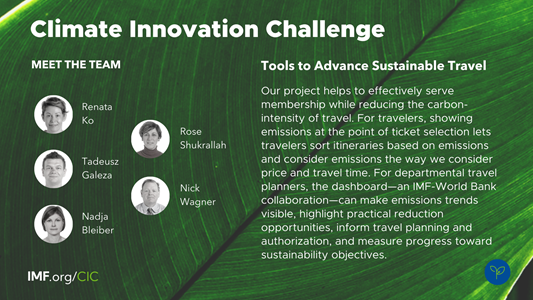
Hunger Monitoring from Space: Climate Shocks, Agricultural Stress, and Food Security

Top Nine Proposals
The IMF is pleased to announce the shortlisting of the top nine project proposals of the Climate Innovation Challenge. Congratulations to the teams!
The challenge received 45 proposals from country authorities, CSOs, IMF staff, and other IFIs around the world. The proposals were carefully evaluated against the challenge criteria by a panel of 23 IMF and external topic experts to shortlist the finalists.
The top nine finalists have been be invited to take part in the innovation training and solution development bootcamp starting in January. The teams that successfully complete the bootcamp will pitch their project proposals at the Final Pitch Event during the 2022 Spring Meetings, where the winning teams will be selected and announced.
List of top nine proposals:
- Machine Learning-Based Toolbox for Climate Policy Analysis
- Adapting External Sector Assessments to Climate Change
- Model-Based Macroeconomic Frameworks for Assessing Climate Impact
- Monitoring Disaster-Related Trade Disruptions from Space
- Reducing Carbon Footprint Through Green Procurement
- DMXi—Introducing Scenario Analysis to Integrate Climate Change in Your Country’s Macro Framework
- Tools to Advance Sustainable Travel
- Hunger Monitoring from Space: Climate Shocks, Agricultural Stress, and Food Security
- Road to Net-Zero: Occupational Mobility and Labor Reallocation Impacts of Climate Transition Shocks
About the Challenge
At the IMF, climate change is now at the heart of our work on economic and financial stability, growth, and jobs. Policy innovation is central to helping member countries reduce emissions, build resilience, and capture the opportunities for greener growth.
How might we integrate climate change into economic analysis to promote green policies?
To help answer this question, the IMF is organizing an innovation challenge on the economic and financial stability aspects of climate change. Country authorities/agencies, civil society organizations (including think tanks), and staff from the IMF, World Bank, and international organizations are invited to submit proposals that have the potential to enhance the IMF’s capacity development, policy advice, and operational impact in areas where economic and financial policies intersect with climate change.




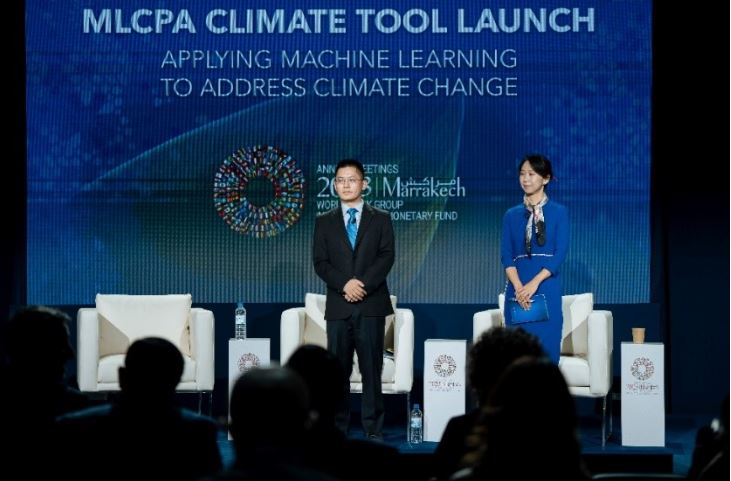
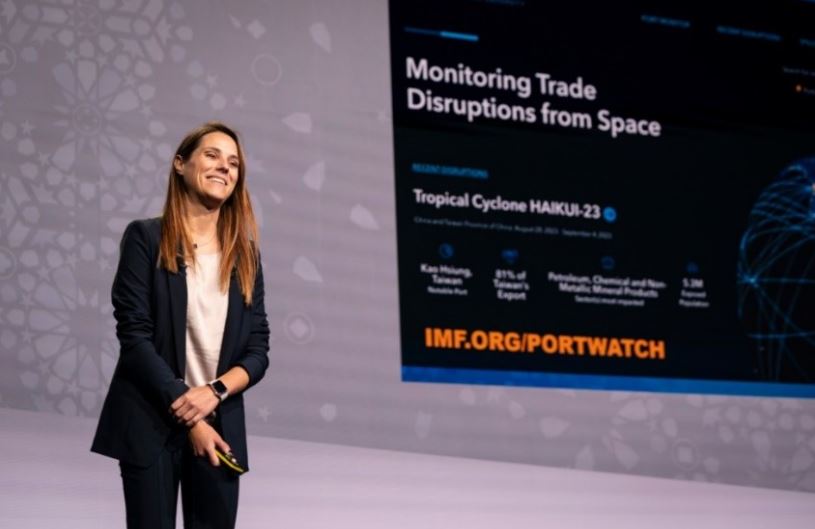
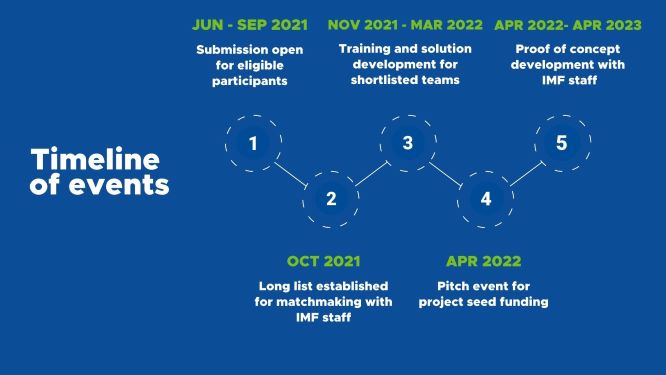 [No text in field]
[No text in field]

